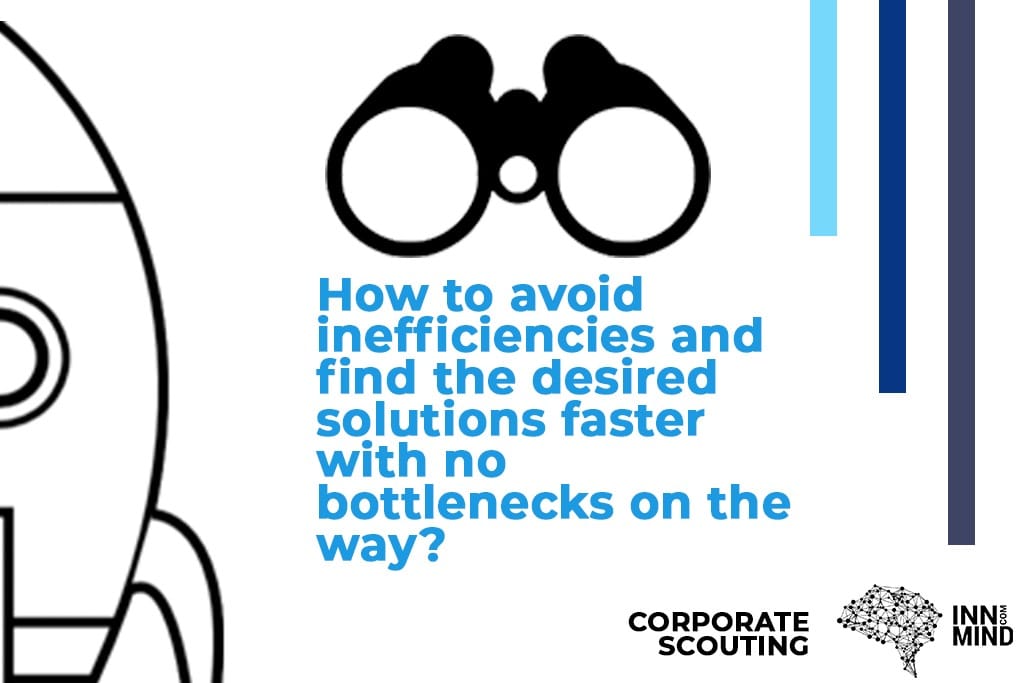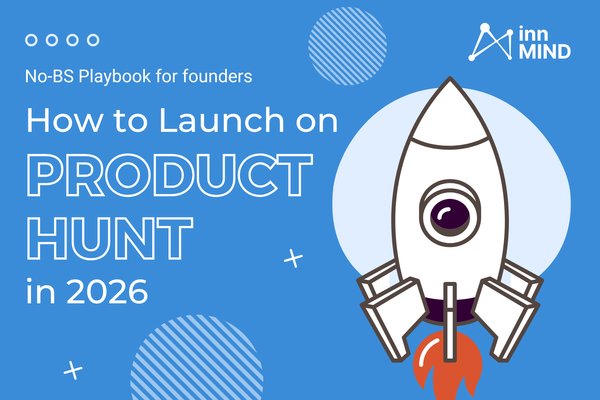Most Common Challenges Corporates Face While Scouting Innovative Startups
How to avoid inefficiencies in the corporate scouting process and find the desired solutions faster with no bottlenecks on the way?

Corporate Venture Capital (also known as ‘CVC’) and Corporate Innovation Hubs face multiple challenges on their way to find perfect-fit innovative solutions. In many cases startup scouting is a time and resource consuming process which needs many attempts before finding a good fit. How to avoid inefficiencies and find the desired solutions faster with no bottlenecks on the way? The InnMind team collected feedback from tens of corporate partners in order to analyze the most common challenges organizations face and possible facilitators.
But before we invite you to subscribe to our newsletter and get weekly insights on innovation development and growth in your mailbox!
Corporate innovation is a well-known term that has impacted millions of startups across technological sectors as they are the ones serving as a number one supply of disruptive solutions to well-established multinationals, as well as medium and big industrial corporations. According to Deloitte’s report, 92% of businesses across Europe see advances in new technologies as the primary trigger behind innovation, with new consumer expectations (86%) as the second most important. It was also recently reported by Forbes that two-thirds of companies innovate in order to grow or differentiate themselves from their competitors.
It’s a common natural cycle happening when a company grows and the innovative development slows down due to changes in the organizational structure, multiple layers of decision-making, bureaucratic red tape and other inevitable factors. At the same time, customer needs are constantly going through a rapid change, which means innovation is needed just to survive to stay ahead of the corporate game.
The typical methods of integrating innovation might be the following:
- Setting up an internal corporate innovation lab to allow employees test their ideas
- Launch an acceleration program to incubate external solutions for further internal deployment within the company
- Integrate startup scouting/challenges as a regular activity supported by external startup ecosystem enablers
Startup scouting which is the last (but not least) in the list above results to be most effective for corporate divisions and allows them to minimise the waste of resources. ‘Passive’ scouting, meaning a constant search for new market innovations, or a dedicated launch of innovation challenges as a regular activity (let’s say once per quartal) based on specific technological goals, are often seen as a perfect combination for innovation boost and smooth integration. Although it also requires specific knowledge to form a qualitative startup funnel or pipeline and select the ones that will enhance your initial business or venture goals.
If, as a corporate innovation division, we already got through the layer of bureaucratic challenge approving the scouting pilot, then we are half a way through to success! However, based on the experience and feedback received from InnMind corporate network, we have identified the following obstacles that can be encountered on the way later on:
- Lack of aggregated startup information available
Research is the first common step that corporate innovation teams start with while looking for relevant solutions. Due to the fact that there is no single platform that combines all startups from all over the world, some might stick to certain databases that parce information or apply a combination of many. The main issue here is that most of the platforms simply build their data stack by online parsing, they don’t really reveal insights, for instance regarding the active funding round of a startup, current business development stage and other details that are not exposed in open sources, but are crucial for decision making. The consequence - waste of resources due to unjustified time consumption forming a large pipeline of potential innovators, which may result as irrelevant based on initial lack of information.
At InnMind platform, tech entrepreneurs are the ones that create their startup profiles themselves, filling in all the information regarding their products & solutions, niche markets, stage of development and other details coming from the first hand. This way, corporate innovation hubs have access to transparent information of over 11,000+ technological startups from more than 78 countries, getting actual and relevant data on each company.
- Unqualified and irrelevant applicants
By practice, when the scouting target is identified and established, companies enable an omni-channel strategy to communicate an open call for innovators to submit their solutions. If communicated correctly, the team behind an open call starts to receive tons of applications from startups, whereby almost half of them don’t read at least 30% of the challenge announcement and selection criteria. As a result, companies simply can not manually process such an amount of applications to pre-select the relevant ones on time and with minimum time consumption. Automating the applications scoring might be a ‘worth-it’ option here to be able to get rid of irrelevant submissions prior to manual selection.
- Unreliable scouting providers & unstructured workflow
Of course, the best thing in this whole process is to delegate the scouting duties to someone who will identify the niche goals, form the pipeline, execute the X amount of pre-selection layers and conduct verification talks with the final startup teams to identify the ‘winners’. Here is when the outsource scouting specialists come in. Although, it is also the case when other issues might arise, such as budget overrun, lack of expertise, unclear structure of scouting process, delays in deliverables and lack of workflow transparency.
On top of that, the majority of providers stick to ‘overpricing’ model while working with corporates based on the consideration that budgets are limitless and such a big company can afford anything. In reality, this is all about the price Vs value ratio that has to be sane in order to scale the processes up and work with the same provider long-term. If the innovation scouting providers are confident enough in what they do, a trial project together with a corporate is a must-offer thing before discussing any permanent agreements to see the actual results and if they match with your expectations.
- Lack of clear business goals & deferred commitment
Either it is a passive scouting executed by the internal team or active open call facilitated by a scouting provider - clear goals, result orientation and team commitment are key factors that many companies overlook. That is why in most of the cases initial identification, negotiation and confirmation of the scouting criteria counts as 50% of work done. After that, it is the matter of following the established workflow, efficient reporting and timely feedback from all the stakeholders involved in such a process.
- Limited access to co-investing network of partners
The question of innovation financing to launch a pilot within or outside a company usually pops up when a certain solution is already found and preliminary tested. However most of the corporates start to think about the potential sources of financing at the time when the goals of scouting are being discussed. Depending on the target and internal capabilities, companies might require additional external co-financing support to finance these innovations and this is when the VC & financial institutions network should come in place. Expanding the network of co-investing partners and gaining access to reliable Venture Capital firms is a complicated and long-term process, which requires additional resources and time.
InnMind as a global ecosystem connects not only startups with investors and corporates, but also corporates with investors and vica versa with over 1,000 investors registered on the platform and 3,000+ financial institutions, business angels, VCs, family offices connected to the ecosystem. Both manual introductions and automatic match-making process on the platform are executed based on such factors as investment criteria, stage of startups development, markets and etc, to make sure the proposed co-investing collaboration is a match for both sides.
Overall, innovation is a key factor that stimulates and drives both, startups and large corporations, to move on and be one step ahead through valuable and beneficial for all parties collaboration. It is always the matter of trial and error, but also external expertise in decision-making to identify the best way to reach innovation goals that will impact business development and competition as an end result.
InnMind, #1 European digital ecosystem for startups, investors and corporates. Register or sign in on the platform to get access to the pipeline of the strongest tech startups and investment ecosystem players.
Read other post in our blog:








